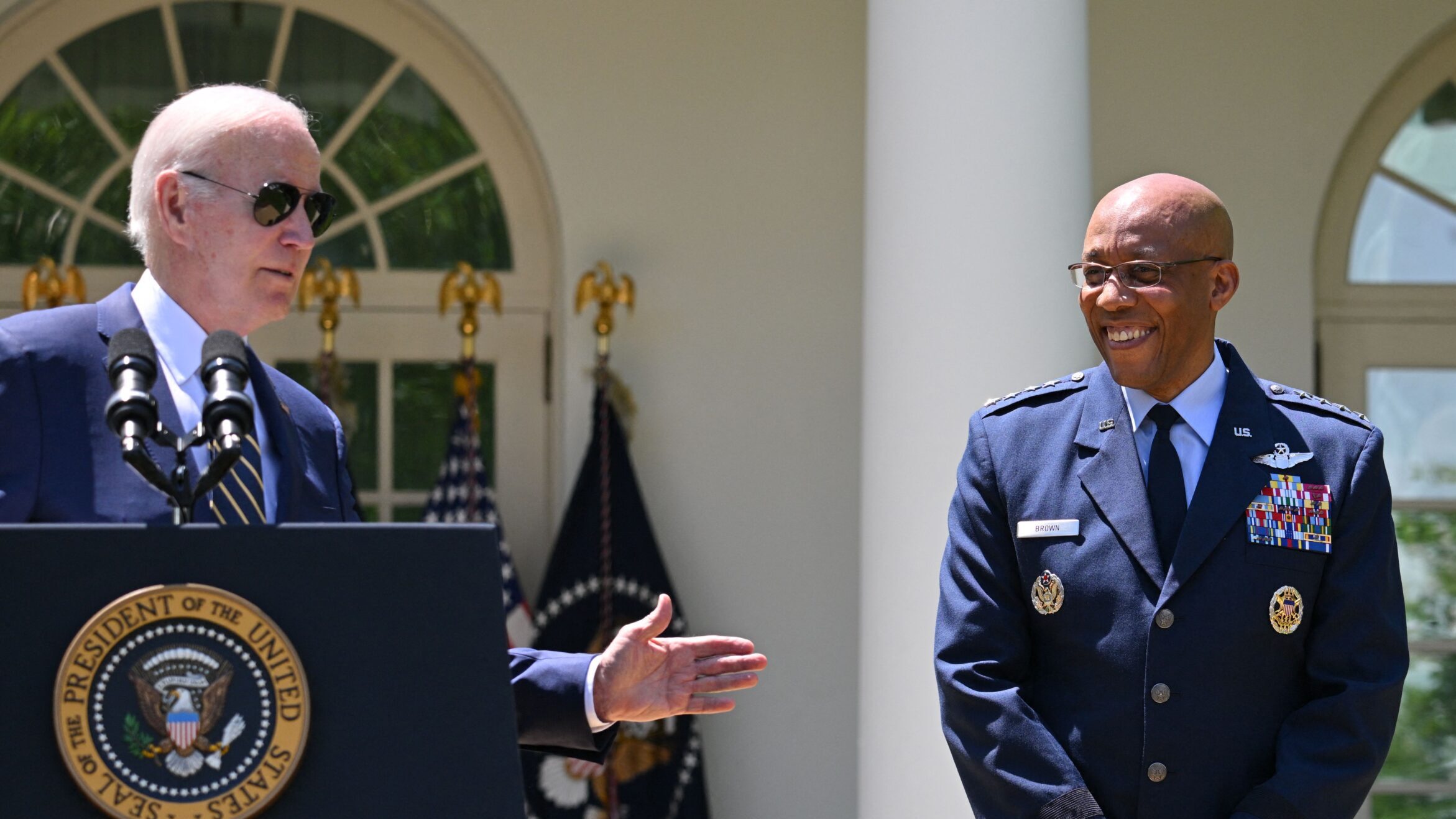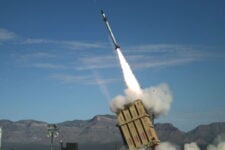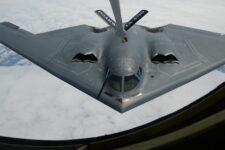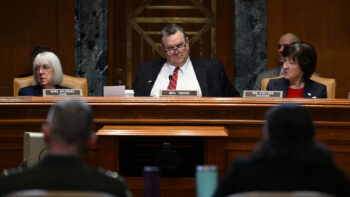
US President Joe Biden announces his nomination of Air Force General Charles Brown, Jr. (R), to serve as the next Chairman of the Joint Chiefs of Staff, in the Rose Garden of the White House in Washington, DC, May 25, 2023. (Photo by MANDEL NGAN/AFP via Getty Images)
The congressional confirmation process offers US lawmakers, and through them the American public, the important chance to ask direct questions of the nation’s military leaders about how they see threats abroad and weaknesses at home. In the op-ed below, AEI’s John Ferrari highlights 10 (okay, 11) key questions that he says should be on senators’ lips as the Joint Chief nominations come before them.
This summer, there will be a remarkable change in the leadership of our nation’s military, with four of five service chiefs changing out, in addition to the chairman.
Military nominees are a special class within our political system because the Constitution splits the responsibility for our military between the executive and legislative branches. While the president is the Commander in Chief, Congress is tasked with “raising and maintaining” the military. Thus, while the president interacts with the Joint Chiefs routinely, the Senate must ensure that they too have access to the unvarnished professional military advice of the chiefs, starting with real questions and real answers during confirmation.
To date, the Senate has held a hearing for only one of these key positions: the commandant of the Marine Corps. As they prepare for the other hearings, here are 10 essential questions, with one bonus question, that the Senate should consider asking of each nominee.
Do you think the United States will be engaged in war before 2030 or after 2030?
This is an important question to understand decision-making within the Pentagon. Current Pentagon leaders are willing to take on risk this decade to build out the force we may need in 2030. Knowing where the prospective members of the Joint Chiefs stand on this is crucial to informing Congress’s own role in building up American forces.
A Pentagon planning assumption is that we will fight one war at a time, do you believe this to be a realistic assumption?
In addition to assuming war is more likely in 2030 than today, current Pentagon leaders have assumed we will only fight one war at a time. As the leaders of our military, it’s critical to learn from our Joint Chiefs if they believe that our potential adversaries will respect this assumption or exploit it.
Do you believe our munition stockpiles are adequate to fight and win an extended war with China?
Over the past several decades, we have gone to war and run out of critical munitions specific to that war. For example, we ran short of bullets in Iraq, precision munitions in Syria, and now artillery shells in Ukraine. Congress should understand what the Joint Chiefs believe munitions expenditure may be like in a war with China and what munitions would be most effective in such a fight.
Do you think that the US needs a larger or smaller force posture in Europe?
Despite recent boosts in troop numbers, successive administrations have been reducing the US military presence in Europe over the past thirty years. There is talk that with Finland having joined NATO, and hopefully Sweden next, the US military can reduce its footprint further. Congress should be informed of the best military advice for presence in Europe given the Russian invasion of Ukraine.
Do you believe that pulling capacity out of the Middle East and Africa was the correct strategic move for US security?
In order to prioritize Great Power competition, our military footprint has either decreased or seen attempted decreases in these two regions, only to find that China and Russia have filled the void we left.
Do you support providing a 30 percent pay raise to the junior enlisted force?
We are in the midst of one of the worst recruiting crises in the 50-year history of the all-volunteer force. House appropriators have proposed a 30 percent pay raise for junior enlisted service members. Many political actors believe the recruiting crisis is either because the military is too woke or not woke enough. These concerns may not be the most relevant factor, however, as a lack of recruits may just be a result of the military failing to take Economics 101 and not paying a fair market wage.
Do you believe that the increase in capabilities of military weapons has more than made up for the decrease in capacity?
To fund every exquisite and expensive new weapon system, as well as reduce costs due to inflation, the military has been shrinking. The justification for these new weapons is that since they are so much better than the old ones, we can have fewer of them. Understanding this tradeoff in capacity vs. capability is an important input from the Joint Chiefs.
Do you believe that going forward, we can continue to shrink the capacity of the force or are we already too small today?
Even more important than understanding where the chiefs are on the prior trade of capabilities vs. capacity is knowing where they stand on future trades of capacity. Knowing if they believe that the military can get smaller, or if it is too small now is critical for matching the military’s requirements to our national strategy.
Do you believe our current weapon systems are the best in the world, and if not, whose are better?
The chiefs run the requirements process inside the Pentagon from which the civilian leaders gain justifications to procure new weapons. Many military leaders have lamented that US weapons are falling behind other nations’ to justify buying newer equipment. Knowing if the incoming chiefs believe that our current systems trail or lead our adversaries is essential to helping Congress make decisions on weapons procurement.
As you set the requirements for military weapons, do you believe in incrementally improving current weapon systems or building new weapon systems from scratch?
While the acquisition of military systems is run by the civilian leadership within the Pentagon, understanding how the chiefs weigh the benefits and risks of incremental improvements that take a few years versus new build systems that take over a decade will help Congress shape the future path of acquisitions.
Bonus Question: On its current path, do you believe the United States Navy will be able to meet our national security needs in 2030?
Some might find it strange to ask each service chief about the Navy, but the United States is and always will be a maritime power. With Congress’s National Commission on the Future of the Navy (slowly) being stood up, it would be appropriate to understand what the incoming Joint Chiefs believe the Commission should be examining.
Our military leaders take an oath not to the president but to the Constitution of the United States. Congress is responsible for raising and maintaining the military. As such, it plays a vital role on behalf of the American people to perform this public job interview with each prospective nominee. Only with access to this professional military judgement can Congress do its job and the American people can be assured that if it provides the Pentagon with over $800 billion per year, the military can actually defend our nation and win our wars.
Another note: Given the gravity of the situation in the world and the responsibility that the Congress has to provide this advice and consent of the nominees, the Congress should immediately move forward with hearings and up/down votes for the nominees. Stalling the nominations of military leaders due to disagreements between the political branches does not enhance our national security and it does indeed hurt readiness and military families. First, it demeans the solemn constitutional responsibility that the Congress has because if stalling these nominations do no harm, then why bother with the process at all? If it does not matter, then the Secretary of Defense should just move and promote the military officers. If in fact it does matter, and just about everyone believes it does, then the mass hostage taking is just one more break of civil discourse in this country and the “they did it, so can we” argument will grind the promotions of our military leadership to a halt. If we want our military leaders to be above politics and non-partisan, then we should treat them that way.
Retired U.S. Army Maj. Gen. John Ferrari is a senior nonresident fellow at the American Enterprise Institute think tank. Ferrari previously served as a director of program analysis and evaluation for the Army.






















